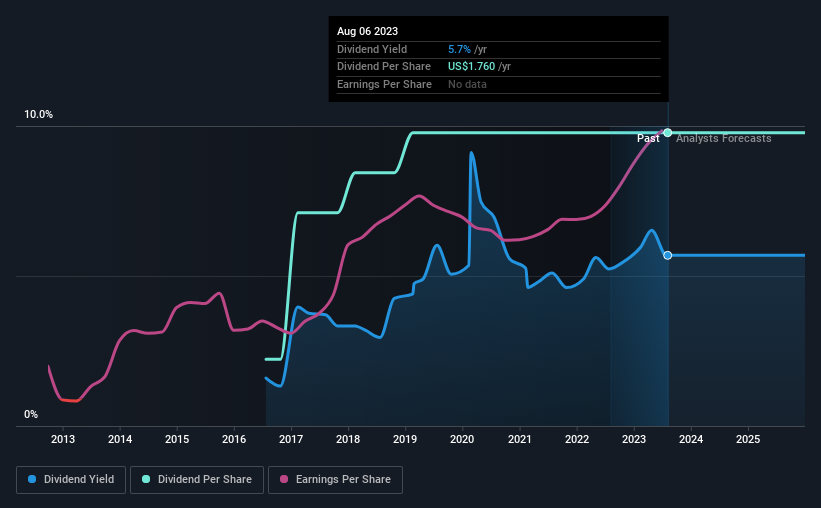Should You Buy The Bank of N.T. Butterfield & Son Limited (NYSE:NTB) For Its Upcoming Dividend?
Some investors rely on dividends for growing their wealth, and if you're one of those dividend sleuths, you might be intrigued to know that The Bank of N.T. Butterfield & Son Limited (NYSE:NTB) is about to go ex-dividend in just 4 days. The ex-dividend date is usually set to be one business day before the record date which is the cut-off date on which you must be present on the company's books as a shareholder in order to receive the dividend. The ex-dividend date is important because any transaction on a stock needs to have been settled before the record date in order to be eligible for a dividend. Accordingly, Bank of N.T. Butterfield & Son investors that purchase the stock on or after the 11th of August will not receive the dividend, which will be paid on the 28th of August.
The company's upcoming dividend is US$0.44 a share, following on from the last 12 months, when the company distributed a total of US$1.76 per share to shareholders. Last year's total dividend payments show that Bank of N.T. Butterfield & Son has a trailing yield of 5.7% on the current share price of $30.94. Dividends are a major contributor to investment returns for long term holders, but only if the dividend continues to be paid. So we need to investigate whether Bank of N.T. Butterfield & Son can afford its dividend, and if the dividend could grow.
View our latest analysis for Bank of N.T. Butterfield & Son
Dividends are typically paid out of company income, so if a company pays out more than it earned, its dividend is usually at a higher risk of being cut. Bank of N.T. Butterfield & Son paid out a comfortable 36% of its profit last year.
Generally speaking, the lower a company's payout ratios, the more resilient its dividend usually is.
Click here to see the company's payout ratio, plus analyst estimates of its future dividends.
Have Earnings And Dividends Been Growing?
Businesses with strong growth prospects usually make the best dividend payers, because it's easier to grow dividends when earnings per share are improving. If business enters a downturn and the dividend is cut, the company could see its value fall precipitously. Fortunately for readers, Bank of N.T. Butterfield & Son's earnings per share have been growing at 12% a year for the past five years.
Many investors will assess a company's dividend performance by evaluating how much the dividend payments have changed over time. In the last seven years, Bank of N.T. Butterfield & Son has lifted its dividend by approximately 24% a year on average. Both per-share earnings and dividends have both been growing rapidly in recent times, which is great to see.
The Bottom Line
From a dividend perspective, should investors buy or avoid Bank of N.T. Butterfield & Son? Typically, companies that are growing rapidly and paying out a low fraction of earnings are keeping the profits for reinvestment in the business. This is one of the most attractive investment combinations under this analysis, as it can create substantial value for investors over the long run. We think this is a pretty attractive combination, and would be interested in investigating Bank of N.T. Butterfield & Son more closely.
On that note, you'll want to research what risks Bank of N.T. Butterfield & Son is facing. To help with this, we've discovered 2 warning signs for Bank of N.T. Butterfield & Son (1 is potentially serious!) that you ought to be aware of before buying the shares.
A common investing mistake is buying the first interesting stock you see. Here you can find a full list of high-yield dividend stocks.
Have feedback on this article? Concerned about the content? Get in touch with us directly. Alternatively, email editorial-team (at) simplywallst.com.
This article by Simply Wall St is general in nature. We provide commentary based on historical data and analyst forecasts only using an unbiased methodology and our articles are not intended to be financial advice. It does not constitute a recommendation to buy or sell any stock, and does not take account of your objectives, or your financial situation. We aim to bring you long-term focused analysis driven by fundamental data. Note that our analysis may not factor in the latest price-sensitive company announcements or qualitative material. Simply Wall St has no position in any stocks mentioned.

